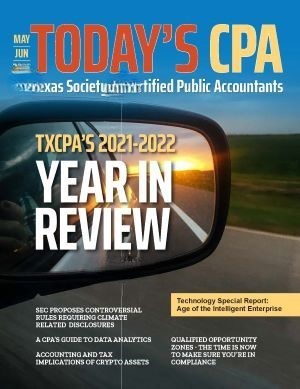SEC Proposes Controversial Rules Requiring Climate Related Disclosures
ACCOUNTING & AUDITING COLUMN
By Don Carpenter, MSAcc/CPA
It is rare to watch a newscast currently without at least one feature addressing climate change. International summits warn of the impacts of fossil fuel emissions on the environment and nations announce lofty goals for reducing these emissions over specific time horizons. Not surprisingly, both corporations and their investor pools have responded to these concerns.
In March, the SEC released proposed rules requiring reporting entities to include extensive disclosures regarding climate-related matters in registration statements and the annual Form 10-K. The proposed rules run to more than 500 pages.
Anticipating that these new requirements will not be welcomed in all quarters, the rationale and motivation for them encompasses the first 40 pages. In this introduction, the SEC highlights its obligations to protect the interests of investors and provide information that is meaningful in making investment decisions. They also point to recent developments in reporting frameworks and data standardization by the Task Force on Climate-Related Financial Disclosure and the Greenhouse Gas Protocol to support the timing of this proposal.
The proposed rules require new disclosures in the following categories:
1) The oversight and governance of climate-related risks by the registrant’s board and management;
2) How climate-related risks identified by the registrant have had or are likely to have a material impact on its business and financial statements over the short-, medium- and long-term;
3) How identified climate-related risks have affected or are likely to affect the registrant’s strategy, business model and outlook;
4) The processes used by the registrant to identify, assess and manage climate-related risks and whether any such processes are integrated into the overall risk management system;
5) Scope 1 and Scope 2 greenhouse emissions metrics, separately disclosed, by constituent greenhouse gasses and in aggregate in both absolute and intensity terms (to clarify, Scope 1 emissions are emissions that occur from sources controlled or owned by the organization; Scope 2 are indirect emissions associated with the purchase of energy used by the organization);
6) Scope 3 emissions if material or if the registrant has set GHG emissions reduction targets that include these emissions (Scope 3 include upstream emissions associated with purchased products, business travel, etc., as well as downstream activities such as emissions from the use of the company’s products or from further processing of such products);
7) The registrant’s climate-related targets and goals and any transition plans;
8) The impact of climate-related events (such as severe weather events or natural disasters) on specific financial statement line items.
Although not required, the disclosures can also include information related to any opportunities identified by the reporting entity arising from climate-related matters.
The first seven items listed above are required under an amendment to Reg. S-K. The additional disclosures will require a new section to the Form 10-K. However, referencing other sections of the report such as Risk Factors, MD&A or the Business Description within that new section is allowed to avoid redundancy.
The most difficult requirement under the amendment to Reg. S-K will likely be the disclosure of the Scope 1, Scope 2 and Scope 3 emissions. To further complicate the requirement, Large Accelerated Filers and Accelerated Filers will be required to include an attestation report with the Form 10-K and information about the attestation provider.
An initial transition period will allow for a limited attestation similar to the assurance currently provided on interim reports such as the Form 10-Q. This is followed by a second transition period requiring reasonable assurance defined as a level of assurance that the information provided is free from material misstatement.
The attestation report is required to address both the accuracy and consistency of the information reported.
This report may be provided by an independent subject matter expert such as engineering or environmental consultants who may be more qualified to address the topic than a registered public accounting firm.
Item 8 above will be required by an amendment to Reg. S-X. This information will be required to be included in a note to the company’s audited financial statements and is therefore required to be audited by the registrant’s accounting firm. In addition, it is included in the assessment of internal control over the integrity of financial reporting. The reporting under this requirement falls within three categories:
1) Financial statement impacts from both severe weather events or natural disasters, as well as the financial impacts of actions taken to reduce emissions or mitigate climate-related risks;
2) Expenditures related to the items listed in 1 separately aggregated between expenses and capitalized costs;
3) Extent to which estimates and assumptions affecting the financial statements are dependent upon climate-related risks.
The SEC emphasized that these disclosures are considered “filed” rather than “furnished” and are therefore subject to potential liability under the Exchange Act. A safe harbor provision is included specifically for Scope 3 emission reporting unless it can be demonstrated that the disclosure was made without a reasonable basis or in bad faith.
The disclosures will be phased in with Large Accelerated Filers, including all information except Scope 3 reporting in the first full year following adoption, with Scope 3 to follow one year later. Accelerated and Non-accelerated Filers follow one year later. And Smaller Reporting Companies begin in the third year with exemption from Scope 3 reporting entirely.
Given the nature of these proposed rules and the effort required to capture and report the information, it is anticipated that there will be significant comment and possibly even legal action in response. The SEC hopes to finalize the rules by the end of 2022, which would require Large Accelerated Filers to address the rules in their 2023 Form 10-K filed in 2024.
About the Author: Don Carpenter is clinical professor of accounting at Baylor University. Contact him at Don_Carpenter@baylor.edu.























